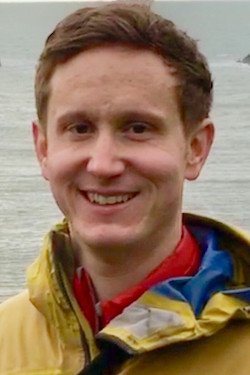Robert Hilton
2018 United Kingdom Award Finalist — Faculty

Current Position:
Reader, Department of Geography
Institution:
Durham University
Discipline:
Environmental Chemistry & Biogeochemistry

Current Position:
Reader, Department of Geography
Institution:
Durham University
Discipline:
Environmental Chemistry & Biogeochemistry
Recognized for: Reformatting the global carbon cycle to include geomorphological processes and weathering that were discovered to have a profound effect upon the dynamic interchange of terrestrially locked and atmospheric carbon.
Areas of Research Interest and Expertise: Geochemistry, Geomorphology, Rivers, Carbon Cycle, Isotope Composition
Biography:
BA/MSci MA Cantab, Natural Sciences, University of Cambridge
PhD, Department of Earth Sciences, University of Cambridge (Advisors: Dr. Albert Galy & Dr. Niels Hovius)
Research & Training Fellow (ATER), Université Paris Diderot, Institut de Physique du Globe, Paris, France (Advisor: Prof. Jerome Gaillardet)
Dr. Hilton’s research has provided new insights on Earth’s long term carbon cycle and the natural processes which transfer CO2 between the atmosphere and rocks. His research has uncovered how erosion of land in the form of geomorphic events (earthquakes and resulting landslides), weathering of organic carbon in rocks, and the export of carbon by rivers can impact atmospheric CO2 concentration. For years, these carbon transfers remained poorly studied as they are difficult to measure and quantify. Dr. Hilton and colleagues have developed geochemical and river sampling methods which allow this to be done. In a collaborative study with Chinese colleagues, Hilton traveled to China in the wake of the 2008 Wenchuan earthquake that triggered >50,000 landslides in the Longmen Shan and collected samples from rivers that linked earthquakes to carbon transfer for the first time. Recent research spearheaded by Hilton has taken him to the Canadian Arctic, where he has assessed how erosion by the Mackenzie River leads to a long-term accumulation of carbon in sediments.
Much attention has been placed on the release of CO2 into the atmosphere through the actions of humans burning fossil fuels. Dr. Hilton’s research highlights that the natural rates of this process (by weathering and breakdown of rocks) is much, much slower. It also shows that many of the mechanisms by which this CO2 can be removed from the atmosphere (e.g. by carbon burial at sea) are not quick enough to react to human CO2 emissions. The planet is currently undergoing dramatic changes with respect to global climate, and it is crucially important to consider whether these aspects of the carbon cycle may amplify human impacts. Dr. Robert Hilton has led a number of “first-of-a-kind” studies to shed light on forgotten and overlooked geomorphic processes that help shape our Earth and maintain atmospheric stability over the planet’s long history.
“I am inspired by the colossal tectonic forces which build steep mountains, and the processes of erosion and weathering which can tear them back down again. Rivers thus modify the shape of the landscape, but they also act to move elements such as carbon and oxygen between the atmosphere and rocks. Ever since learning about these linkages during my Natural Sciences degree, I have been motivated to delve deeper and measure these geochemical fluxes. My current research priority is to better understand how erosion and exposure of carbon in soils and rocks might dampen, or amplify, anthropogenic CO2 emissions over the coming century.”
Key Publications:
Other Honors:
2017 International Partnership Award for Young Scientists (Chinese Academy of Scientists)
2014 Outstanding Young Scientist of the European Geosciences Union (EGU)
In the Media:
Anchorage Daily News - Study: Canada's Mackenzie River carries carbon from thawing permafrost to burial at sea
Science Daily - River buries permafrost carbon at sea
The Economist - How earthquakes help capture carbon dioxide